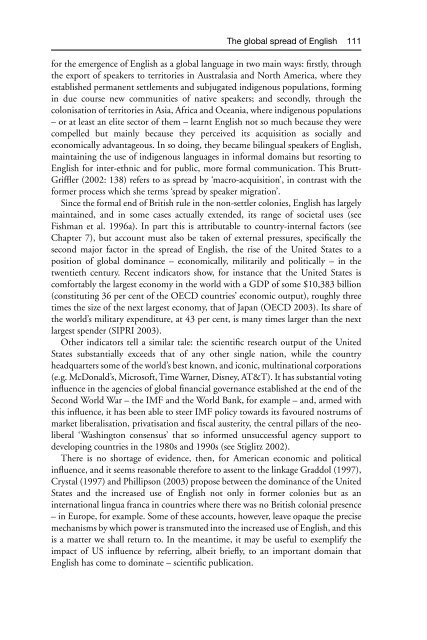Gibson Ferguson Language Planning and Education Edinburgh ...
Gibson Ferguson Language Planning and Education Edinburgh ...
Gibson Ferguson Language Planning and Education Edinburgh ...
You also want an ePaper? Increase the reach of your titles
YUMPU automatically turns print PDFs into web optimized ePapers that Google loves.
The global spread of English 111<br />
for the emergence of English as a global language in two main ways: firstly, through<br />
the export of speakers to territories in Australasia <strong>and</strong> North America, where they<br />
established permanent settlements <strong>and</strong> subjugated indigenous populations, forming<br />
in due course new communities of native speakers; <strong>and</strong> secondly, through the<br />
colonisation of territories in Asia, Africa <strong>and</strong> Oceania, where indigenous populations<br />
– or at least an elite sector of them – learnt English not so much because they were<br />
compelled but mainly because they perceived its acquisition as socially <strong>and</strong><br />
economically advantageous. In so doing, they became bilingual speakers of English,<br />
maintaining the use of indigenous languages in informal domains but resorting to<br />
English for inter-ethnic <strong>and</strong> for public, more formal communication. This Brutt-<br />
Griffler (2002: 138) refers to as spread by ‘macro-acquisition’, in contrast with the<br />
former process which she terms ‘spread by speaker migration’.<br />
Since the formal end of British rule in the non-settler colonies, English has largely<br />
maintained, <strong>and</strong> in some cases actually extended, its range of societal uses (see<br />
Fishman et al. 1996a). In part this is attributable to country-internal factors (see<br />
Chapter 7), but account must also be taken of external pressures, specifically the<br />
second major factor in the spread of English, the rise of the United States to a<br />
position of global dominance – economically, militarily <strong>and</strong> politically – in the<br />
twentieth century. Recent indicators show, for instance that the United States is<br />
comfortably the largest economy in the world with a GDP of some $10,383 billion<br />
(constituting 36 per cent of the OECD countries’ economic output), roughly three<br />
times the size of the next largest economy, that of Japan (OECD 2003). Its share of<br />
the world’s military expenditure, at 43 per cent, is many times larger than the next<br />
largest spender (SIPRI 2003).<br />
Other indicators tell a similar tale: the scientific research output of the United<br />
States substantially exceeds that of any other single nation, while the country<br />
headquarters some of the world’s best known, <strong>and</strong> iconic, multinational corporations<br />
(e.g. McDonald’s, Microsoft, Time Warner, Disney, AT&T). It has substantial voting<br />
influence in the agencies of global financial governance established at the end of the<br />
Second World War – the IMF <strong>and</strong> the World Bank, for example – <strong>and</strong>, armed with<br />
this influence, it has been able to steer IMF policy towards its favoured nostrums of<br />
market liberalisation, privatisation <strong>and</strong> fiscal austerity, the central pillars of the neoliberal<br />
‘Washington consensus’ that so informed unsuccessful agency support to<br />
developing countries in the 1980s <strong>and</strong> 1990s (see Stiglitz 2002).<br />
There is no shortage of evidence, then, for American economic <strong>and</strong> political<br />
influence, <strong>and</strong> it seems reasonable therefore to assent to the linkage Graddol (1997),<br />
Crystal (1997) <strong>and</strong> Phillipson (2003) propose between the dominance of the United<br />
States <strong>and</strong> the increased use of English not only in former colonies but as an<br />
international lingua franca in countries where there was no British colonial presence<br />
– in Europe, for example. Some of these accounts, however, leave opaque the precise<br />
mechanisms by which power is transmuted into the increased use of English, <strong>and</strong> this<br />
is a matter we shall return to. In the meantime, it may be useful to exemplify the<br />
impact of US influence by referring, albeit briefly, to an important domain that<br />
English has come to dominate – scientific publication.






